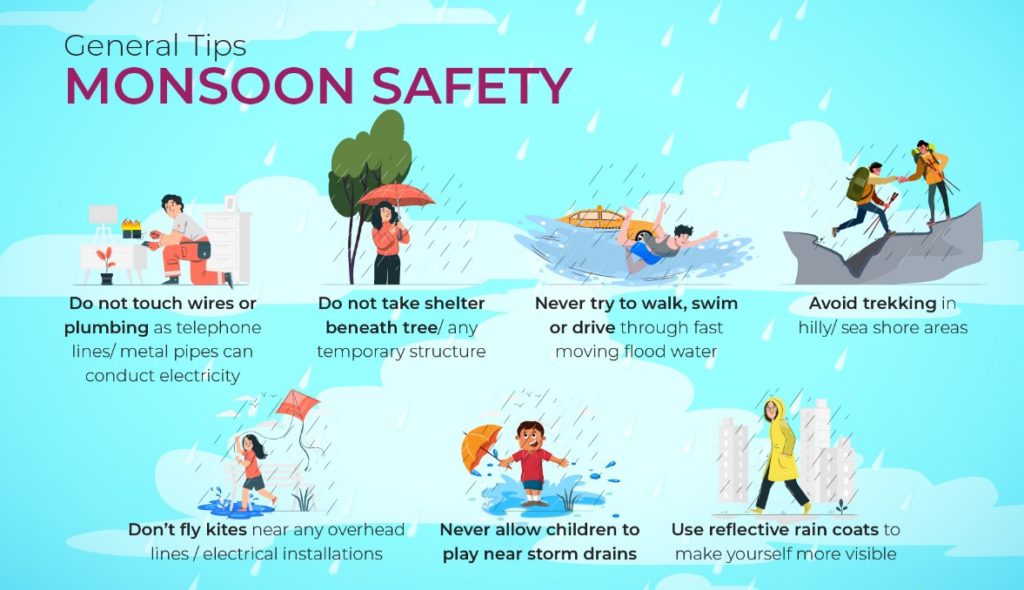Safety Tips During Monsoon Weather Season in Pakistan
Introduction
The monsoon season in Pakistan brings much-needed relief from the scorching summer heat but also comes with its own set of challenges. Heavy rains, strong winds, and the risk of flooding can pose significant threats to safety and well-being. It is crucial to be well-prepared and take necessary precautions to ensure safety during this period. This blog provides comprehensive safety tips to help you and your family stay safe during the monsoon season.
Preparing Your Home
Ensuring Roof and Walls are Leak-Proof
- Inspect Your Roof: Regularly check your roof for any signs of damage, such as cracks or holes. Address these issues promptly to prevent water from seeping through.
- Repair Cracks and Holes: Use appropriate sealants or waterproofing materials to repair any cracks or holes in the walls and roof.
- Waterproofing Solutions: Apply a waterproofing solution to your roof and exterior walls to enhance their resistance to heavy rains.
Securing Doors and Windows
- Check Seals and Stripping: Ensure that all doors and windows have proper seals and weather stripping to prevent water from entering.
- Install Storm Shutters: Consider installing storm shutters or heavy-duty window coverings to protect against strong winds and flying debris.
- Use Sandbags: In areas prone to flooding, place sandbags around doorways and other entry points to block water from entering.
Clearing Drainage Systems
- Clean Gutters and Downspouts: Regularly clean gutters and downspouts to ensure they are free from leaves, dirt, and debris. This allows rainwater to flow freely and prevents overflow.
- Inspect Drainage Pipes: Check all drainage pipes for blockages and clear them if necessary. Ensure that the drainage system is functioning properly to avoid water backup.
- Maintain Sewage Systems: Ensure that your sewage system is in good working condition to prevent backflow and contamination during heavy rains.
Personal Safety Measures
Avoiding Unnecessary Travel
- Stay Indoors: During heavy rain and storms, it is best to stay indoors and avoid venturing out unless absolutely necessary.
- Postpone Non-Essential Trips: Delay any non-essential trips or errands until the weather improves. If you must travel, plan your route carefully and avoid flood-prone areas.
- Stay Informed: Keep informed about road conditions and weather forecasts. Use reliable sources and apps to stay updated.
Wearing Appropriate Clothing and Footwear
- Waterproof Clothing: Wear waterproof clothing such as raincoats and jackets to stay dry. Ensure that your clothing is breathable to avoid discomfort.
- Proper Footwear: Wear waterproof shoes or boots with good grip to prevent slipping. Avoid open-toed shoes or sandals.
- Carry an Umbrella: Always carry an umbrella or a waterproof jacket when going outside to protect yourself from sudden downpours.
Keeping an Emergency Kit Ready
- Emergency Supplies: Prepare an emergency kit with essential items such as first aid supplies, flashlights, batteries, and non-perishable food items.
- Important Documents: Keep important documents such as identification papers, insurance policies, and emergency contact numbers in a waterproof bag.
- Communication Devices: Ensure that you have a charged mobile phone and backup power sources, such as power banks, to stay connected during emergencies.
Health Precautions
Preventing Waterborne Diseases
- Avoid Stagnant Water: Do not walk or play in stagnant water, as it can be a breeding ground for harmful bacteria and mosquitoes.
- Use Mosquito Repellent: Apply mosquito repellent to prevent mosquito bites, which can spread diseases such as dengue and malaria.
- Proper Garbage Disposal: Dispose of garbage properly and ensure that it is not left in open areas where it can attract insects and rodents.
Maintaining Hygiene
- Frequent Hand Washing: Wash your hands frequently with soap and clean water, especially after coming into contact with rainwater or floodwater.
- Disinfect Surfaces: Regularly disinfect surfaces in your home to reduce the risk of infections. Use appropriate cleaning agents.
- Avoid Street Food: During the monsoon, avoid consuming food from street vendors, as the risk of contamination is higher.
Ensuring Safe Drinking Water
- Boil Water: Boil water before drinking to kill any harmful bacteria and pathogens. Allow the water to cool before consuming.
- Use Water Purifiers: If available, use water purifiers or filters to ensure that your drinking water is safe.
- Store Water Properly: Store drinking water in clean, covered containers to prevent contamination.
Travel and Road Safety
Driving Carefully on Wet Roads
- Reduce Speed: Drive at a reduced speed to maintain better control of your vehicle on wet and slippery roads.
- Maintain Safe Distance: Keep a safe distance from other vehicles to allow for adequate braking distance.
- Use Headlights and Wipers: Use your headlights and windshield wipers to improve visibility during heavy rain.
Checking the Weather Forecast
- Stay Updated: Regularly check the weather forecast before planning any travel. Use reliable weather apps and news sources.
- Plan Accordingly: Plan your travel around the weather conditions. Avoid traveling during times of heavy rainfall or storms.
- Inform Others: Let family or friends know about your travel plans and expected arrival times.
Avoiding Flooded Areas
- Do Not Drive Through Floodwaters: Avoid driving through flooded roads, as it can be difficult to gauge the depth and condition of the road underneath.
- Find Alternative Routes: Look for alternative routes to your destination that are less likely to be affected by flooding.
- Follow Traffic Advisories: Pay attention to traffic advisories and warnings issued by local authorities and follow their instructions.
Emergency Preparedness
Knowing Emergency Contact Numbers
- List of Contacts: Keep a list of emergency contact numbers, including local authorities, emergency services, and nearby hospitals.
- Inform Family Members: Ensure that all family members are aware of these contact numbers and know how to reach them.
Having a Family Emergency Plan
- Discuss and Plan: Discuss and create an emergency plan with your family. Ensure that everyone knows their roles and responsibilities.
- Designate a Safe Meeting Place: Designate a safe meeting place where family members can gather in case of an evacuation.
- Practice Drills: Regularly practice emergency drills to ensure that everyone is familiar with the plan and can act quickly in an emergency.
Staying Informed Through Reliable Sources
-
- Follow Updates: Follow updates from reliable news sources and meteorological departments for the latest information on weather conditions.
- Use Real-Time Alerts
Use apps and websites that provide real-time weather alerts and warnings.
-
- Community Connection
Stay connected with community groups and local authorities for updates and assistance.
Conclusion
The monsoon season in Pakistan, while bringing much-needed rain, also requires us to be vigilant and prepared. By following these safety tips, you can protect yourself and your loved ones from potential hazards. Stay informed, stay prepared, and most importantly, stay safe during the monsoon weather season.
Remember, a little preparation goes a long way in ensuring safety and well-being. Embrace the rains with caution and enjoy the beauty of the monsoon season responsibly.
This completes the detailed blog post.
Let me know if you need any further adjustments or additional sections.




